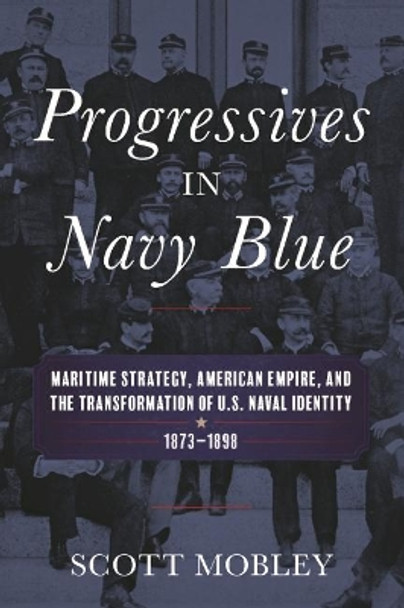Description
For most of the nineteenth century, the United States maintained a ""peace"" navy to support aspirations for an overseas maritime empire. The Navy during this time existed principally to police and promote U.S. commercial activities abroad. Meanwhile, civil leaders remained confident they could improvise a ""war"" navy to meet any emergency the nation might encounter. Within the officer corps, the peace navy culture bolstered a professional identity that valued expertise in seamanship and gunnery, while attaching little importance to strategy, fleet operations, and other advanced warfare skills.
The 1880s witnessed a fundamental shift in naval mission priorities that helped toreshape both the navy and the professional identity of its officers. Troubled by developments in military technology and international politics, U.S. policy-makerssupplanted the constabulary tradition with a new focus on national defense. Within this shifting context, the ""new navy"" of the 1890s represented a reversal of customary mission sets: war and national security needs eclipsed peace and commercial empire-building as the service's organizing principles. In addition to spurring technological transformation within the fleet, these changes energized efforts to cultivate strategic thought and practice among naval officers, helping to engender anew professional identity-that of ""Strategist.""
The agents of naval transformation embraced a progressive ideology. They viewed science, technology, and expertise as the best means to effect change in a world contorted by modernizing and globalizing trends. Moreover, the methods and accomplishments of Gilded Age naval reformers anticipated the wider surge of U.S. progressive-era development by some ten or twenty years. Within the navy's progressive movement, two new cultures-Strategy and Mechanism-influenced the course of transformation. Although they shared progressive pedigrees, each culture embodied a distinctive vision for the Navy's future. The conflict resulted, and the tensions between strategists and mechanists ultimately forged the dichotomous ""Warrior-Engineer"" identity of modern naval officers.
About the Author
Scott Mobley earned a Ph.D. in history at the University of Wisconsin Madison in 2015. A former surface warfare officer, Mobley graduated from the U.S. Naval Academy and the Naval Postgraduate School. He retired from the U.S. Navy as a captain, having commanded a frigate and a fast combat logistics ship. He also servedas reactor officer in a nuclear-powered aircraft carrier. Mobley was awarded the Rear Admiral John D. Hayes Pre-doctoral Fellowship in U.S. Naval History for 2014. In 2015, he was selected as the U.S. Naval Academy Class of 1957 Fellow for researching and teaching naval history.
Reviews
Captain Scott Mobley's book comes at a fortuitous time. The Naval reform movement in the period written about here is of immense importance to understanding one of the factors that shaped American naval policy and grand strategy in the coming 20th century. This work provides essential context for that understanding. Naval officers would be well served to study the generation of officers examined here, a story little known or told, who helped literally to change the world."
-John T. Kuehn, Ph.D., Commander USN (retired), author of America's First General Staff: A Short History of the Rise and Fall of the General Board of the Navy, 1900-1950
"Scott Mobley makes a significant contribution to our understanding of the origins of the modern American navy: how and why it underwent the most complete and thoroughgoing transformation of any of our military services in their histories. He carefully revises previous scholarship, applying thorough research in the sources, his own experience in a distinguished naval career, and his own wise, insightful judgment. This is an important story persuasively told, as valuable for our current military leadership-which struggles to nurture strategic acuity in its officer corps-as for historians and public officials involved in military affairs."
-Richard H. Kohn, Professor Emeritus of History and Peace, War, and Defense, University of North Carolina at Chapel Hill; Chief of Air Force History for the USAF, 1981-1991
"There is much to learn from reading this book. For just as the end of the 19th century saw the United States moving from wooden, wind-powered ships to steel, coal-fired ships, the beginning of the 21st century sees the U.S. Navy moving from manned platforms to unmanned platforms that carry out both surveillance and attack missions. Thus, the same sort of technological, tactical, and strategic tensions that percolated through the Navy between 1872 and 1898 are again being experienced in today's service."
-The Journal of America's Literary Past
"Many of the lessons Mobley identifies can inform today's warrior-engineer debate. As the information age matures and the robotics age emerges, America's navy faces new technological and strategic challenges. Those who trust technology to dominate future warfare and those who argue for the continued need to study the science of war continue to clash, just as they did over a century ago. Lieutenant William Bainbridge-Hoff 's observation rings as validly today as when he uttered it in 1886: '[W]ell-constructed strategy must consider technology, just as technology should be informed by strategy' (p. 207). For this reason, those desiring to advance the naval profession should read this book."
-Naval War College Review, 2018
"Mobley`s book makes not only the transformation of the U.S. Navy to a world leading combat navy better understandable, but gives some detailed insight in the meaning of maritime strategic thinking for the coming generations of Naval Commanders." - MarineForum
"It is not often that a book like this comes out, one that helps fill in a missing picture." - Manhattan Book Review
Book Information
ISBN 9781682471937
Author Scott Mobley
Format Hardback
Page Count 432
Imprint Naval Institute Press
Publisher Naval Institute Press
Weight(grams) 823g
Dimensions(mm) 231mm * 162mm * 40mm



